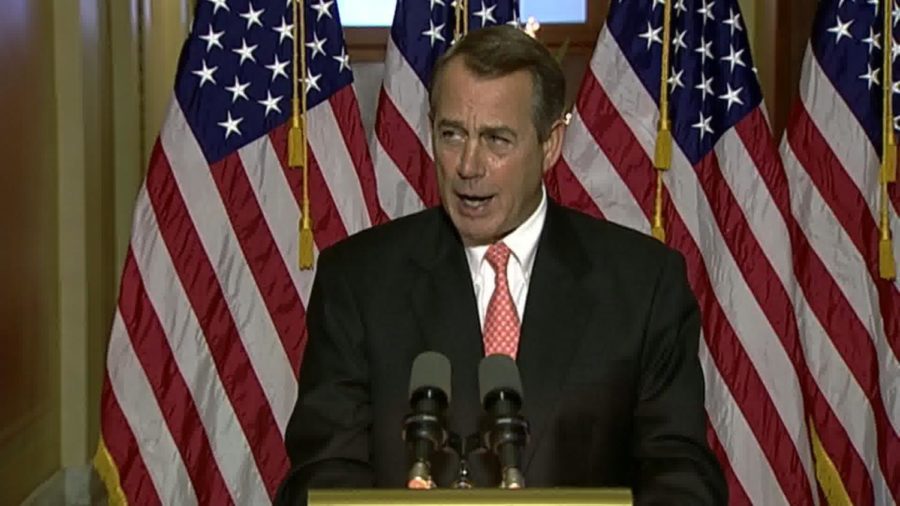House to vote Tuesday on Senate payroll tax plan
House Speaker John Boehner is asking legislators for a one-year continuation of the payroll tax cut instead of a two-month extension.
December 19, 2011
WASHINGTON — House Republican leaders put off until Tuesday a vote on a Senate plan to extend the payroll tax cut and said they were willing to work until the end of the year to negotiate a compromise with Senate Democrats.
The vote had been expected Monday night, but after a long meeting of the House Republican conference, GOP leaders said they would wait until Tuesday.
Majority Whip Kevin McCarthy, R-California, told reporters that it was better to hold the vote “not in the dark of night but in the light of day.”
The delayed vote followed a day of escalating brinksmanship as legislators stepped up their game of chicken over the expiring payroll tax cut.
Democrats flatly rejected House Speaker John Boehner’s demand to ditch the two-month extension passed by the Senate last week in favor of an immediate one-year continuation.
Boehner and other GOP leaders argued that the two-month proposal amounts to a short-term fix instead of resolving the issue to provide certainty to American taxpayers and businesses.
“We outright reject the attempt by the Senate to kick the can down for 60 days,” Majority Leader Eric Cantor, R-Virginia, said after Monday night’s meeting.
Senate Majority Leader Harry Reid, D-Nevada, earlier blasted Boehner for allegedly abandoning the Senate compromise, which was forged when party leaders were unable to agree on the terms of a one-year plan and received strong bipartisan support in an 89-10 vote last Saturday.
“I negotiated a compromise[with Senate Minority Leader Mitch McConnell, R-Kentucky] at Speaker Boehner’s request. I will not reopen negotiations until the House follows through and passes this agreement that was negotiated by Republican leaders and supported by 90 percent of the Senate,” Reid said.
White House Press Secretary Jay Carney called Boehner’s stance “nonsensical,” stating that it “takes compromise to get something done” under divided government.
“Americans paying attention to this must be pulling their hair out,” Carney said.
Boehner, however, said Monday night that “we disagreed with what the Senate produced.”
“They did their job,” he said of his call last week for the Senate to send the House a proposal. “They produced a bill, and the House disagreed with it.”
At stake is the looming expiration of a tax break that is worth roughly $1,000 a year for an average family and affects roughly 160 million Americans. Congress also needs to address expiring emergency federal unemployment benefits and the renewal of the so-called “doc fix,” a delay in significant scheduled pay cuts to Medicare physicians.
All three measures are currently set to expire December 31.
Boehner said Monday evening that he expects the GOP-controlled House to reject the Senate’s two-month extension. He and other GOP leaders said the House would also vote on a motion to set up a conference committee with the Senate that would work out a compromise between the Senate plan and a House bill passed last week that calls for a one-year extension of the payroll tax cut.
Both measures also extend unemployment benefits and the doc fix, and the GOP plan also would push for presidential action on the proposed Keystone XL oil pipeline from Canada to the Gulf of Mexico.
A conference committee would require the Democratic-controlled Senate to return from its holiday break.
“Are you willing to work over the holidays?” asked Rep. Jeb Hensarling, R-Texas, on Monday night, in reference to the Senate.
Democratic sources, however, maintain they have no intention of buckling to the House GOP’s demands.
On Monday, at least five mostly moderate Republican senators voiced disapproval with the possible defeat of the Senate plan, demonstrating increasing pressure on House Republicans to pass it.
The group included Massachusetts Sen. Scott Brown, Maine Sens. Olympia Snowe and Susan Collins, Indiana Sen. Richard Lugar and Nevada Sen. Dean Heller.
“During this time of divided government, both parties need to be reasonable and come to the negotiating table in good faith,” said Brown, who is facing a stiff re-election challenge in heavily Democratic Massachusetts next year. “We cannot allow rigid partisan ideology and unwillingness to compromise stand in the way of working together for the good of the American people.”
Meanwhile, five Democratic senators called on House Republicans to pass the Senate plan in order to speed up approval of the Keystone pipeline under a provision demanded by Republican negotiators.
The $33 billion Senate bill — which only covers the payroll tax cut, unemployment benefits, and the doc fix through the end of February — is facing fierce resistance from House conservatives upset with both the temporary nature of the bill and its impact on funding for Social Security.
An earlier House version of the measure — which would have continued the payroll tax cut for a year, among other things — was never brought to a vote in the Senate. Democrats and Republicans remain at sharp odds over how to pay for a full 12-month extension.
Congressional Democratic leaders insist the Republican-led House will be blamed for a year-end increase in working Americans’ tax bills if it fails to go along with the Senate.
“This is a pass-the-popcorn moment for Democrats,” one senior congressional Democratic leadership aide told CNN Monday. “Boehner has been hung out to dry by his caucus, and we are not going to save him.”
The Senate’s two-month extension was a fallback position after Democrats and Republicans were unable to reach a more long term, comprehensive agreement.
Reid said in a statement Sunday that Boehner had earlier left it to Senate leaders to come up with a deal, but changed his tune after the Senate easily adopted the two-month extension.
“Neither side got everything they wanted, but we forged a middle ground that passed the Senate by an overwhelming bipartisan majority,” Reid said. If the Senate measure doesn’t clear the House, “Republicans will be forcing a thousand-dollar tax increase on middle class families on January 1st.”
Under the current party breakdown in the House, at least 26 Republicans would have to join a unanimous Democratic minority to pass the Senate measure. Any slippage in Democratic support would require more Republican backing.
Boehner appears to have reversed himself since a conference call with caucus members Saturday, when he was the only House Republican leader to express support for the Senate plan, according to a GOP source.
The source said Boehner described the Senate vote as “a good deal” and “a victory” in the conference call. For his part, the speaker insisted Monday that he raised concerns about the Senate plan “from the moment I heard of it.”
Boehner said he only praised a provision in the Senate bill requiring presidential action on the Keystone pipeline.
“The rank-and-file members are extremely opposed” to the Senate plan, a GOP source stressed, adding that most members were concerned with the uncertainty caused by just a two-month extension, as well as the political benefit the White House could gain in the national dialogue over taxes.
House Minority Leader Nancy Pelosi, D-California, said in a statement Sunday that conservative House Republicans are standing in the way of an agreement.
“By holding up this bipartisan compromise, tea party House Republicans are walking away once again, showing their extremism and clearly demonstrating that they never intended to give the middle class a tax cut,” Pelosi said.
The two-month measure, which passed the Senate on Saturday, would reduce the deficit by nearly $3 billion, according to the Congressional Budget Office.
Under the plan, its $33 billion in costs would be offset by an increase in fees that new homeowners with federally backed mortgages will pay to Fannie Mae, Freddie Mac and the Federal Housing Administration. Those entities would then turn that money over to the U.S. Treasury.
The bump amounts to about $15 per month for every $200,000 borrowed, Senate aides estimated.
CNN’s Athena Jones, Rebecca Stewart, Deirdre Walsh, Ted Barrett, Kate Bolduan, Dana Bash, and Erin Burnett contributed to this report.






